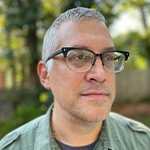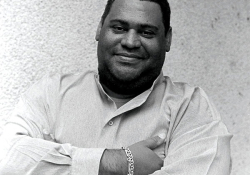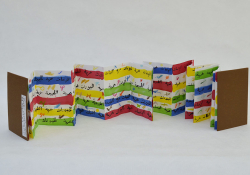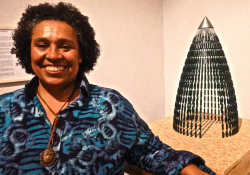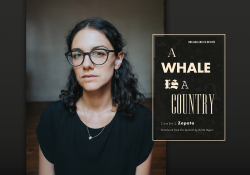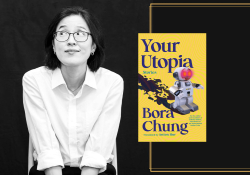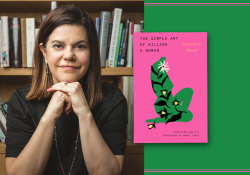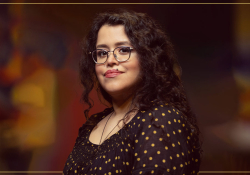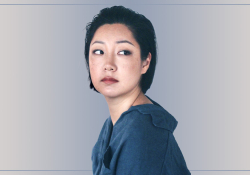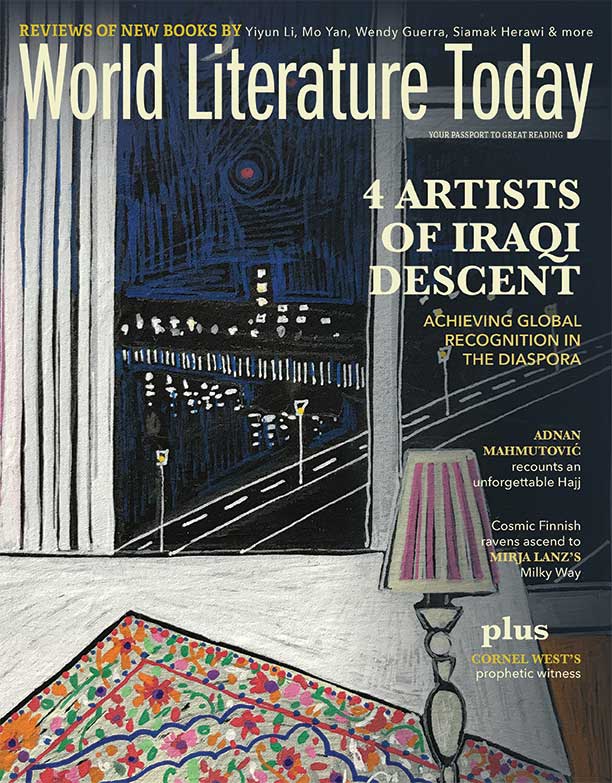Hanging between Two Different Worlds: A Conversation with Ahmed Naji
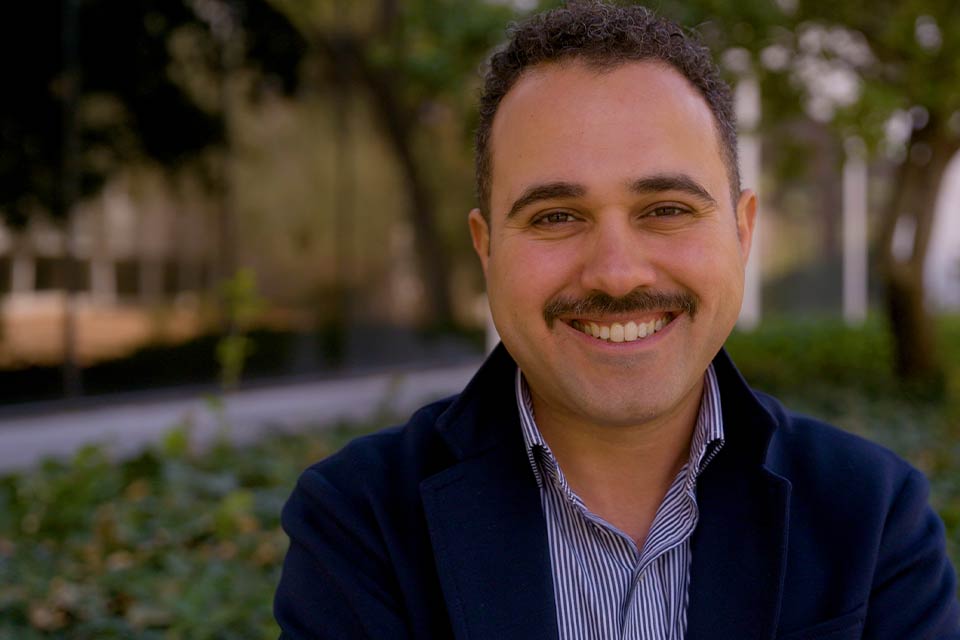 In February 2016, after the publication of his energetic, imaginative, Cairo-set novel, Using Life, Ahmed Naji became the first writer in Egyptian history to be imprisoned for “offending public morality,” for erotic scenes in Using Life. Then he found himself in prison, sharing cells with high-profile political activists, and the experience deepened his commitment to literature. In 2016 he received the PEN/Barbey Freedom to Write Award. His new book, Rotten Evidence (McSweeney’s, 2023), translated by Katharine Halls, is a chronicle of his incarceration that confounds the expectations of a prison memoir. In this interview, Naji discusses Rotten Evidence, the responsibility of writers to defend free expression, and the roles of dreams and humor in prison life.
In February 2016, after the publication of his energetic, imaginative, Cairo-set novel, Using Life, Ahmed Naji became the first writer in Egyptian history to be imprisoned for “offending public morality,” for erotic scenes in Using Life. Then he found himself in prison, sharing cells with high-profile political activists, and the experience deepened his commitment to literature. In 2016 he received the PEN/Barbey Freedom to Write Award. His new book, Rotten Evidence (McSweeney’s, 2023), translated by Katharine Halls, is a chronicle of his incarceration that confounds the expectations of a prison memoir. In this interview, Naji discusses Rotten Evidence, the responsibility of writers to defend free expression, and the roles of dreams and humor in prison life.
Rob Roensch: Could you talk a bit about the genesis of Rotten Evidence?
Ahmed Naji: In the beginning, I didn’t want to write about it. In general, I’m not a big fan of prison literature. I have a lot of moral and artistic questions about the meaning of writing about experience in a prison. But at the same time I was looking around, and I was surprised to not find any books written about the situation of current prisons in Egypt, which was very odd because in the last century in Egyptian history, prison literature was a big part of the map of Arab and Egyptian literature. However, in the last decade or two, because of the effect of social media, a lot of people who leave prison, rather than writing a book, they will write a synopsis, update their Facebook status, and just end there because you will take this emotional charge from inside them and that’s it.
The second thing I noticed is how human rights organizations are pushing toward testimony. So, rather than prison literature or writing about prison, we end up with all these human rights testimonies. The problem with human rights testimony is that it’s dealing with you as a victim. It doesn’t care about any other aspect of life like family life or love. Love is not human rights, as we all know, so you aren’t allowed to speak about that. In your human rights testimony you are just a fact talking about suffering, and I thought the experience is more complicated and harder than that.
Roensch: You’ve noted that many prison stories seem to be mainly about suffering and human rights testimony. But your book is very funny. So I wonder if you could talk a bit more why humor is important for you as a writer, and the relationship of humor to solemn subjects like prison.
Naji: I believe the highest literature is if I’m reading a book and it makes me laugh, not smile, but laugh. I believe this is a hard thing to achieve through writing.
Making the reader cry, or feel sympathy, it’s easy. It would be easy for me to write such a book in a melodramatic tone, and suck up to the reader’s empathy. Like, “Oh! I have been a victim!” But again, this is for me a little bit cringe and kitsch, as Milan Kundera would describe it, and second, in general, this is not my style. My style is always using humor and sarcasm in a way that will push people to think about the unthinkable. Humor will elevate the experience and not make me a victim.
My style is always using humor and sarcasm in a way that will push people to think about the unthinkable.
In Arab movies or American movies, when they have a scene happening in prison, they make it very serious and very angry. And this is impossible. I can’t imagine this happening in any prison. People would be angry, but even with this anger, they make fun. They have to, because it’s the only way to survive such harsh conditions.
Or they will even laugh from the humiliation. For example, a prisoner will come inside, and we hear stories that the police officer hit him. Even the prisoner, the victim, will tell us the story while he’s laughing.
I learned in prison how prisoners use humor first to deal with the trauma and hardship of the condition and the experience, and then create space for communication. Because if I’m telling you the story in a melodramatic way, what else could you say but, “Oh, I feel sorry for you,” and that’s it. But if I’m creating it to make a joke, you will laugh, I will laugh. We would be able to heal the trauma, and then you will walk out with a funny story that you could tell. Let’s not forget, even the most harsh experience becomes sweet nostalgia when it becomes memories.
Roensch: I wanted to ask specifically about your sense of audience. Whom are you writing for? Whom are you writing to?
Naji: Usually in an Arab culture context we say, “I have an imaginary reader.” And so we would ask the writer, “What kind of imaginary reader do you have in your mind?” But I found in this culture when they ask such a question, they would like a specific audience, like it’s a marketing plan. And I really don’t know. For me, I think the audience that I care to communicate with is the audience that is interested in literature and in writing itself. And they value the literature as an art and science in the community. The second audience is people who care about freedom of expression. And then you have a third audience of people who care about prison.
Now, as I’m writing in English and trying to craft my style and voice in English, I started also to build an imaginary reader, and through the process of publishing I’m discovering them as I’m waiting for this book to be published. For example, I published several long pieces about immigrants, immigrant psychology, and the environment and Western environmental policy. Suddenly, after I published them, I found a lot of feedback and emails that I received from not only English readers in the US but English readers in Europe, mainly immigrants. For example, I’ll be writing about my experience here in the American West and receive a long message from a Syrian woman in Germany about how she feels about what I wrote about and how she connects with it.
Part of imagining the readers that you are writing to is imagining yourself. And you are creating yourself because at the end of the day we are writing to ourselves. And I started to understand lately that maybe I belong to a new identity: that is, immigrants in general. The scale of it we are witnessing, I believe, is the biggest wave of immigrants in human history. Millions are moving every day from everywhere to everywhere, basically, from South to North. And because this immigration is happening in a time when we have a stable system of nation-states where each state trying to protect their border and identity, they look at immigrants sometimes as threatening. And if the state is threatened, when the immigrants enter, they will give them the label of immigrants, and I am starting to feel that maybe, more and more, I belong to this group, travelers and immigrants who are hanging between two different worlds, and maybe also this is the audience that I’m writing for.
Roensch: Let’s talk a little bit about the form of the book, which is in fragments. It’s not a simple kind of chronological autobiography. Some of it is reflective and some of it is narrative, interspersed with journal entries and excerpts from legal documents. Why did you choose this particular form?
Naji: I am moving more and more toward this form of fragments. This was also a very traditional Arab style until the seventeenth or eighteenth century. Al-Jahiz, for example, was an amazing writer who lived one thousand years ago. He had a marvelous book called Book of Animals. He’s talking about different animals, but the book is not about that. In the middle of it he will ask, What is metaphor in literature? What is the meaning of beautiful writing? What is good writing and bad writing? And this would be written in a very fragmented way that’s scattered, but it creates a very intriguing experience of reading. And I started to discover more and more the beauty of writing fragments by that. Because I think it works fine with the age of short attention that we live in. What I tried to achieve through these fragments was to create something enjoyable and addictive like scrolling. Because when you are scrolling, it’s impossible to predict the next video that will come up.
So my ambition is to have this writing in fragments that allows me first to control the rhythm of the book and also to surprise the reader. I mean, this is not a fiction book. Everyone knows the story. If you search my name, you will see the story. So if it was like a chronicle, I’ll tell you: “Oh, I woke up. I found myself in the prison.” You know, the end. So it will be boring even for me to write it.
The second thing, which is more important for me: during my time in the prison, I wasn’t allowed to write, but I needed to write. I needed to write to keep from not losing my mind and to make sense of the whole experience. So I started writing my dreams, which is something that I had been doing before going to prison. I have a notebook, and I would wake up and write the date and then my dream. So after I left prison, I looked to this notebook because it is only prison diary that I have, and it’s all my dreams. I thought it’s important to include the dreams or part of it within the book because it shows the subconscious, my subconscious and other people’s, and it’s also because I discovered a lot about dreams when I was in prison.
Dreams are important for prisoners because it’s the only window you have as a prisoner to see the other world, to see the people you love and miss. Then in Egypt, in an Egyptian prison, dreams are not only important but a holy thing, because of the story of Joseph, son of Jacob—a story that is mentioned in the three holy books, the Qur’an and the Bible. The story happened in an Egyptian prison, and I was in an Egyptian prison. We were in a very old prison, built during the British occupation. It was more than one hundred years old, and the guards joked with us: “Oh, this is the room of Prophet Joseph.” Dreams are important for all prisoners, but for Egyptian prisoners, it links you with Joseph and his dreams in the Egyptian prison.
Of course, as an intellectual I have knowledge of psychoanalysis and Lacan and Freud. But suddenly when you add in the experience, there is layer and layer to the dreams, and I had to talk about it.
Also, during my time there, I started reading and interpreting dreams for other prisoners. They came to tell me their dreams, and I would give them suggestions as Joseph did. Second, I started reading their coffee cups. In Egypt, they drink a very thick coffee. After you finish you have some muddy coffee, then you flip the cup and look into it, and you are supposed to see your future in your cup of coffee. I used to do this for other prisoners, so I wanted to talk about that. So writing with fragments was a perfect way to not only talk about my daily life in prison but to talk about these subconscious dreams.
My case was the first step of cracking down hard on freedom of expression in Egypt. And after that case the situation became very brutal.
It also allowed me to talk about the legal aspect of the experience, because this was also a political battle at that time in Egypt. My case was the first step in cracking down hard on freedom of expression in Egypt. After that case, the situation became very brutal. People lost hope. So, that’s why I needed to write, to defend myself, because in court I wasn’t allowed. In court, when you are a writer on trial, you are not allowed to speak. The lawyer is the one who speaks on your behalf even though as a writer, writing and language are your wine and bread. But when you are entering the palace of the law, the court, you can’t use that. It becomes your crime, your evidence of committing a crime. So the lawyer told me, if the judge asks you this, you have to say this. And because my lawyer knew me, they would poke me in the back and hold my hand and say to me, during the trial or investigation, Please don’t speak. Don’t open your mouth. If the judge asks you, “Do you want to say anything?”, say no.
The book was my only way, finally, to defend myself, not using the lawyer’s language.
The book was my only way, finally, to defend myself, not using the lawyer’s language.
Roensch: A moment that struck me in your book was when you discover the Literature Review. You write that it was like stepping through a door and there was no going back. What was on the other side of that door? What is there in the content of literature that is so worth protecting, not just as an abstract value of expression, but what is it in the content of literature itself that was so meaningful and powerful?
Naji: Before entering prison, I had already published several books of fiction. I worked at a literary magazine, but I wasn’t that loyal to literature. I was always working in different mediums, but usually I described myself as a journalist. It was only when I entered prison that I started asking myself questions like, What is the meaning of being here? Is it worth it, to be in prison? Because of writing, because of literature?
In prison I discovered another face of literature. Since I was about twenty years old, I have been working on a magazine in Egypt called Akhbar Al Adab, which is like our weekly Arabic New Yorker. So all my life I was surrounded by writers and intellectuals, academics and artists. And my perspective about writing and literature was always coming from those people. When I was in prison, it was my first time to really meet with the regular, normal reader.
Everyone is reading in prison because there is nothing else to do, and suddenly you are having this discussion with prisoners coming from different educational backgrounds about Dostoyevsky, for example. And their point of view on the books that we read was very enlightening for me. For example, I remember very well in my first months, I was speaking with two others and one of them told me, “Could you bring us some more books by this Dostoyevsky?” I was like, “What, Dostoyevsky? You really want to read Dostoyevsky in prison?” And they’re like, “Yeah, he’s so funny. He’s hilarious. He’s the funniest writer that we read here.” And I was shocked, because at that time mostly I came from a background that when we talk about Dostoyevsky, we talk about the formation and building this giant novel and analyzing and psychoanalyzing the characters. But when I asked them, “What’s funny?” they told me, “In all of the books, there must be a clown.” In Dostoyevsky, there is the character of the clown, and the plot of most of his novels is built on misunderstanding time, which is funny. It’s a joke in the end.
I found two things about literature that are important for me now. First is this secret power that I believe exists. This secret power enables the writer and the reader to start a conversation that could happen one hundred years in the future, that could happen now, that could happen in Arabic, in English. I love people. I love communicating with people. I love being able to transfer what I feel and what I question in my mind to people, and I love having conversations.
The second thing is this joy coming from literature that has different pieces, different faces, but in the end I saw how joy is important because it saved me during my time in prison, and I saw it saving other people. I saw people who never opened a book before entering prison, and suddenly in prison, through books and novels, they are discovering a new world. They are reading. They are enjoying the books, and it helps them go through this hardship. And nothing other than literature was helping me or helping those people.
Roensch: What responsibilities do you think a writer has in a time of censorship and repression?
Naji: It’s personal because it’s related to the writer himself and his political agenda and what he believes. But I believe all writers from different backgrounds have an obligation to freedom of expression. And when I say we have an obligation to defend freedom of expression, that doesn’t only mean in the face of dictatorships, military regimes, or other institutions, but sometimes even against common sense, even against society. We have an obligation to defend and understand the other writer, even if we disagree with them. This is the most important responsibility for a writer. The only way for all writers to speak up and debate is to have an open space for this discussion.
The other responsibility for me is as a writer, not an obligation, but I think it’s important also to be active within your community. Because in this way you are able to join the conversation with other writers, and you are able to see yourself within the big picture and defend yourself. You can’t defend yourself alone, as a writer.
I mean, we are facing a lot of challenges, starting with AI. In the situation of the publishing industry, we are living in a monopoly. A situation where we have two or three names controlling the publishing market, not only in America but in the whole world. When you have a publishing house controlling more than 30 percent of the printed English books in the world, that’s dangerous. To be able to defend yourself and your creation, you have to be active in all these circles.
I’m not a big fan of the writer in the ivory tower. You have an obligation to communicate with other writers and to be involved with the struggle and the fight.
August 2023
